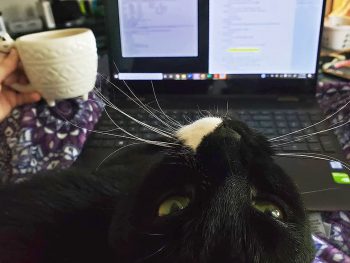
Like dogs and cats, we humans are ultimately social creatures. While the introverts among us may not balk at two or more weeks of limited in-person contact, the social distancing measures being advised by public health experts can still disrupt everyone’s overall social and mental wellbeing.
Fortunately, we don’t have to feel lonely while limiting our contact with the world. Now is a great time to find creative ways to care for ourselves and our relationships with the humans and animals around us.
Here’s how we can do that:
Practice self-care. Set aside some extra unwinding time to indulge in your hobbies. Disruptive times can be stressful, so for the sake of your mental health, watch a movie, draw a picture, read a book, tend to your garden, play a game, write the next great novel—anything you want to do.
Nurture your bonds with friends both two- and four-legged. You may need to be isolated, but you don’t need to feel isolated. Read the same book as some friends and share your thoughts in a group chat. Video call your sibling so you can see, not just listen to, her laugh. Put your cat’s bed on the chair next to your desk so he can supervise your work or school efforts. Maintaining relationships with others is well understood to boost mental health—this includes relationships with animals!
Let’s look at the difference between three terms we’re hearing a lot of lately: social distancing, quarantining, and self-isolating.
- Social distancing means limiting close contact with the world. It means staying in our homes unless necessary, maintaining a distance of six feet away from others, and avoiding handshakes and other physical contact.
- Someone in quarantine has been exposed to an infectious disease and is now being separated from the public while they wait to see if they develop the illness.
- Self-isolation is when someone who experiences symptoms isolates themself from non-sick people to prevent further infection.
Practice the five relationship management strategies. Whether you communicate online or in-person, psychologists outline five important factors in developing strong relationships, which boost psychological wellbeing overall. They are positivity, openness, assurance, task completion, and networking. Each goes a long way in building robust, healthy relationships with friends, family, peers, and even our pets.
Use social media smartly. Sites like Facebook and Twitter are powerful tools to communicate and laugh with friends across distances, and they keep us informed. Perhaps most importantly, they let us post pictures of our pets looking adorable by our sides as we work from home. But they also can overwhelm us with negativity or false information. Be sure to take breaks between communicating, and know when you’ve consumed too much news.
Take care of your body. Maintain a regular sleep schedule, eat healthy foods, avoid excess alcohol and caffeine, and keep moving.
Go outside and take a walk— take a furry friend with you if you’ve got one. It’s important to get fresh air and move your body; a park, nature reserve, or even your street is a great place to do so. Just be sure to follow social distancing recommendations and stay six feet away from others.
These tips are just some of the ways you can boost your mood and connect with others; there are many more ways you can keep in touch with those you care about near and far. Doing so will make this period easier for you and your social networks. It also will make it easier for us as a community to come together, practice social distancing, and protect the more vulnerable among us from infectious disease.
